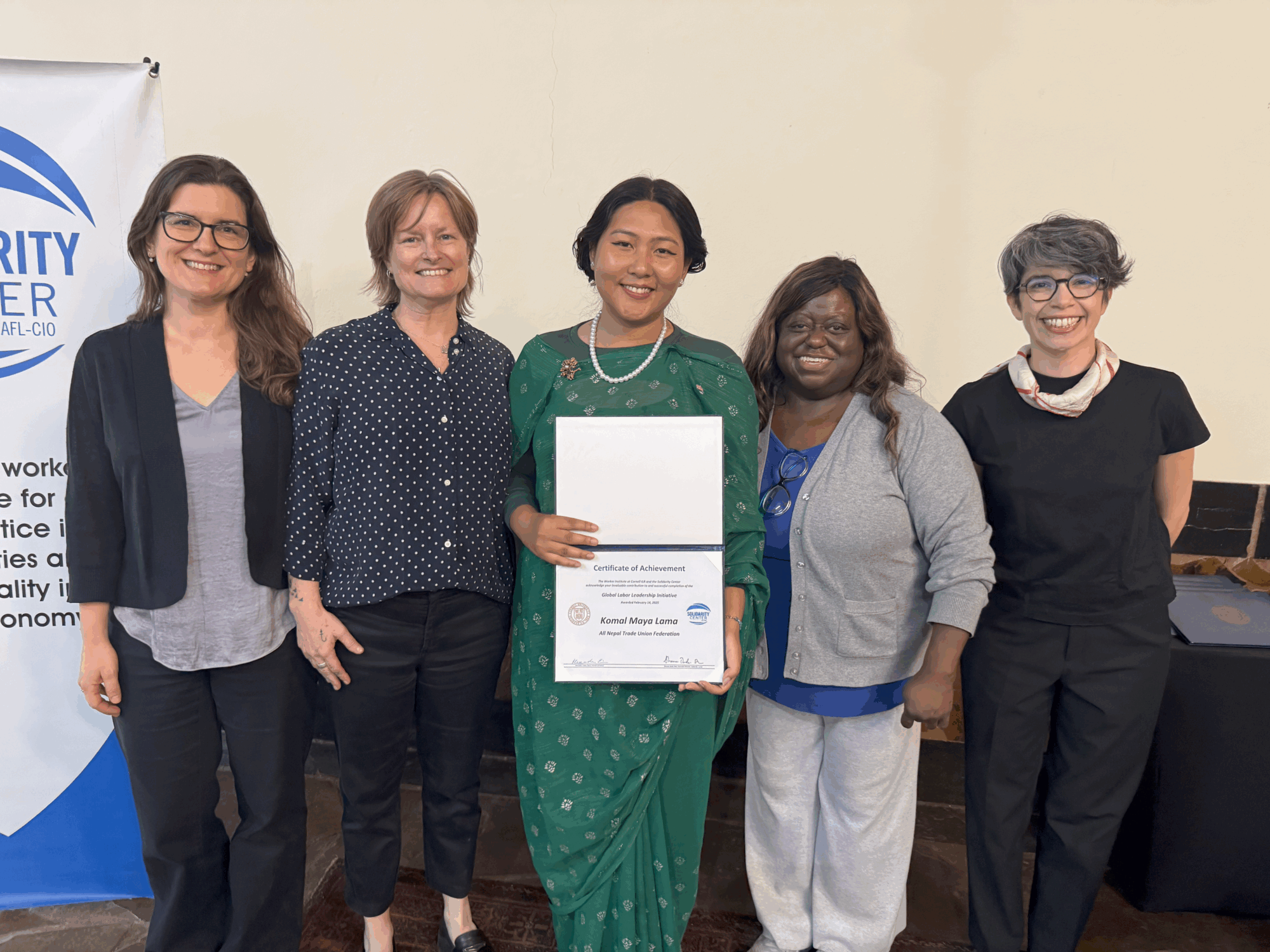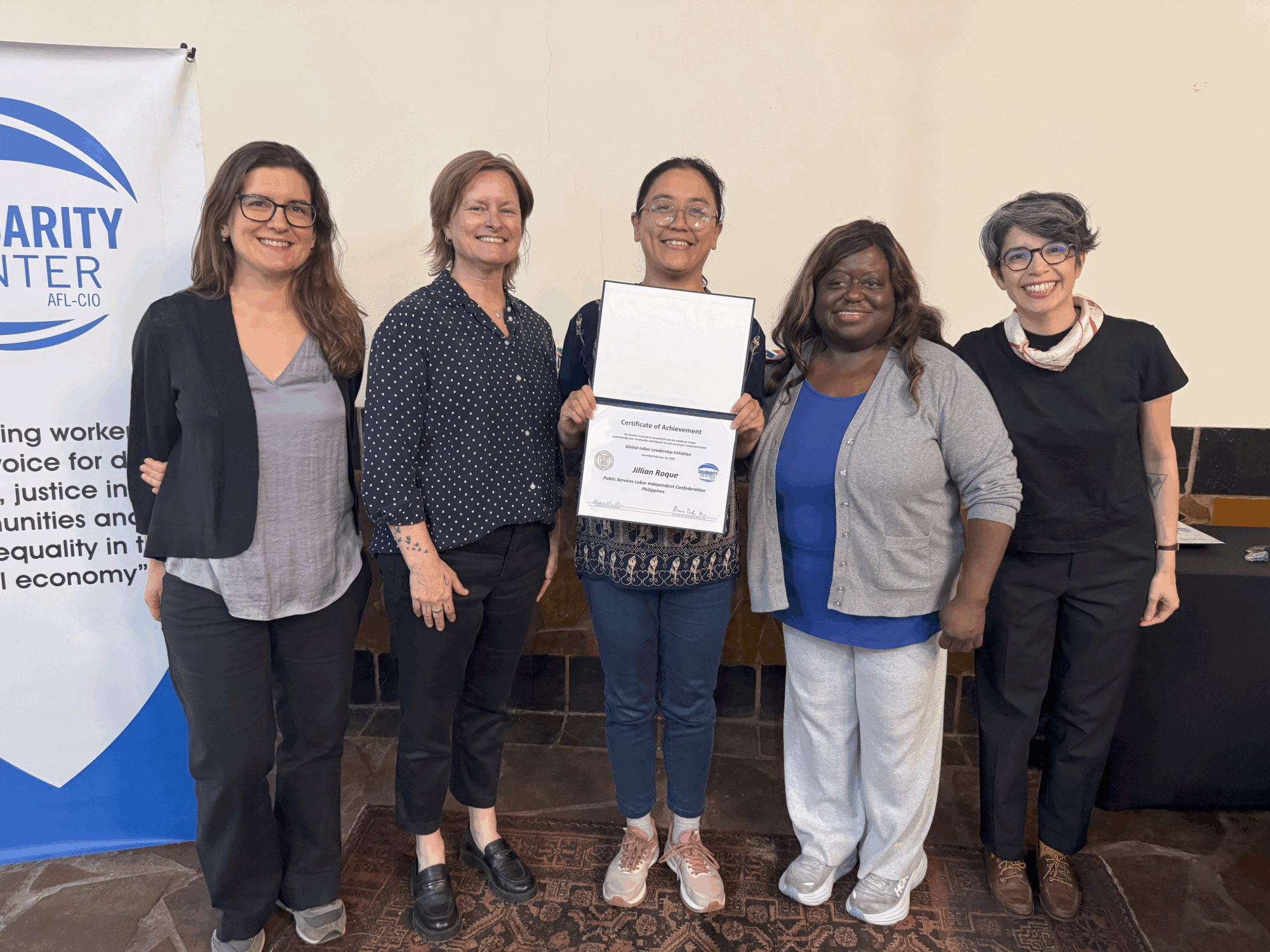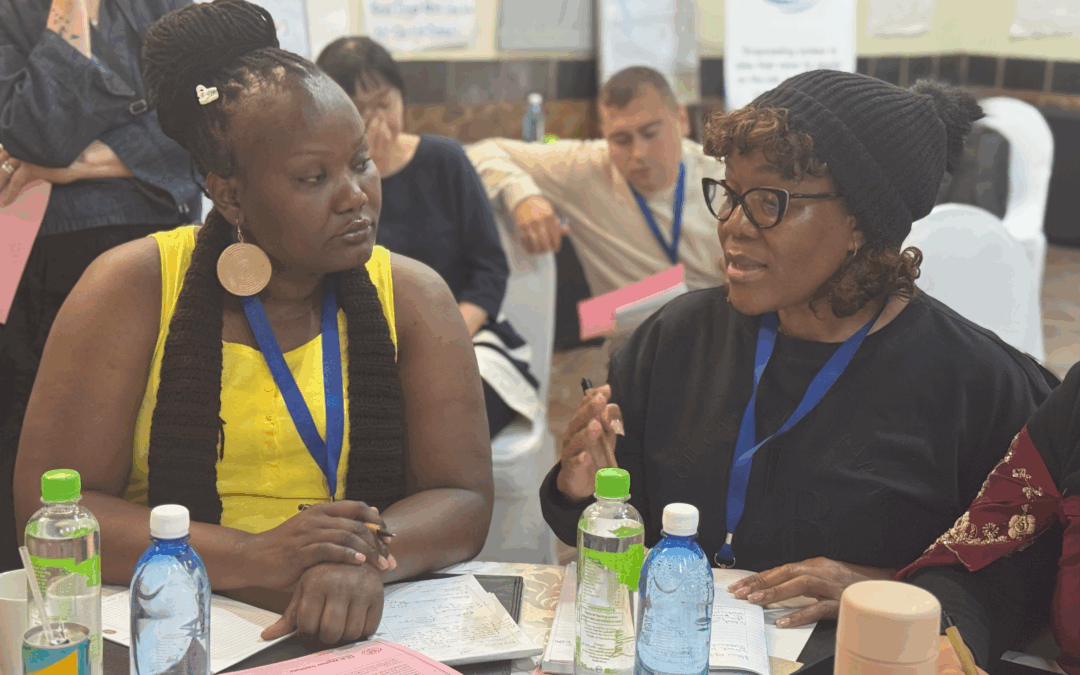Nineteen union leaders and labor rights defenders working to advance democracy in communities around the world convened in South Africa in June as part of the Global Labor Leadership Initiative (GLLI), a multi-year Solidarity Center partnership with Cornell ILR. The GLLI connects union leaders worldwide to share strategies and build stronger movements. By defending rights, winning safer workplaces and lifting new voices into leadership, they show how democracy grows when workers have the power to shape change.

“It feels like I am not alone in this journey,” said All Nepal Health Volunteer Workers’ Union (ANHVWU) President and GLLI participant Komal Maya Lama, who accepted a completion certificate from Solidarity Center and Cornell ILR Worker Institute GLLI facilitators. Photo: Connie Mabin
“It’s amazing to know about the people all over the globe,” said young worker Komal Maya Lama, All Nepal Health Volunteer Workers’ Union (ANHVWU) president and 2025 GLLI participant. “It feels like I am not alone in this journey. I have built a beautiful bond and learned so many things from those leaders.”
Annually, the GLLI provides participants with solidarity and skills-building opportunities so they can help build a dynamic, powerful and inclusive labor movement to transform society and the economy so that it works for workers.
This year, GLLI participants from Kenya, Lesotho, Liberia, the Maldives, Nepal, Nigeria, the Philippines, Serbia, Sierra Leone, South Africa and Taiwan met near Johannesburg from June 22-27 where they shared strategies to tackle in-country and mutual challenges affecting working people, often in the face of brutal conditions, and worked to strengthen global movement building.

“I’ve gained tools I can use to make my leadership more effective,” said Philippines Public Service Labor Independent Confederation (PSLINK) Deputy General Secretary and Chief of Staff Jillian Roque, who accepted a completion certificate from Solidarity Center and Cornell ILR Worker Institute GLLI workshop facilitators. Photo: Connie Mabin
“I’ve gained a lot of very practical things: tools I can use to make my leadership more effective, more strategic, more intentional–the very things we need to really make changes on the ground,” said Jillian Roque, deputy general secretary and chief of staff of the Philippines Public Service Labor Independent Confederation (PSLINK).
Democracy depends on working people and their organizations to keep it resilient, said 2025 GLLI participants, who discussed unions’ unique role and capacity to push back on unjust and undemocratic forces. Building on a 2024 retreat in Sri Lanka that focused on individual leadership assessment and development, the South Africa retreat broadened the lens to thinking about how unions can bolster their organizations and strategies across social movements. They shared approaches for defending and promoting worker rights in the face of an ever-growing assault across the globe on working people.
“Trade unions have the best position to get people really together,” said a GLLI participant who is an independent labor activist.
“Connecting with people doesn’t mean that you put people on social media and attract their attention; it is really about how you can interact with them. Trade unions are so crucial to the democratic movement for discussing issues and hearing people’s voices: To get people really together,” he said.
Worker rights are in free fall across every continent, leading the ITUC to warn this year against a “billionaire coup against democracy that now threatens democracy itself.” According to the 2025 International Trade Union Confederation (ITUC) Global Rights Index, workers’ access to justice was restricted in 72 percent of countries during the reporting period, representing the worst level ever recorded.
As the largest democratic movement in the world, unions are uniquely placed to defend and expand democracy, not only through elections but in the workplace, in communities, and national and global institutions. Where independent unions provide individuals with the opportunity to elect and be leaders, and join in common cause for better wages, benefits and working hours, and where organized labor holds politicians accountable, democracy thrives.
“Unions are a school for teaching people how to organize and fight for their dignity and rights and how people get others to join them. That’s why we’ve seen unions on the forefront in defending democracy in Belarus, in Zimbabwe and eSwatini, in Hong Kong and in Tunisia,” said Solidarity Center Executive Director Shawna Bader-Blau at last year’s GLLI convening, in Washington, D.C..
Unions benefiting from their leaderships’ participation in the 2025 GLLI in South Africa included:
- Kenya’s Amalgamated Union of Kenya Metal Workers (AUKMW)
- Kenya Medical Practitioners Pharmacists and Dentists Union (KMPDU)
- Lesotho Public Employees Union (LEPEU)
- Liberia’s United Workers Union of Liberia (UWUL)
- Maldives Health Professional Union (MTUC)
- Nepal’s All Nepal Health Volunteer Workers’ Union (ANHVWU)
- Nepal’s General Federation of Nepalese Trade Unions (GEFONT)
- Nepal Trade Union Congress (NTUC)
- Nigeria’s Federation of Informal Sector Workers of Nigeria (FIWON)
- Philippines’ Associated Labor Union (ALU)
- Philippines’ Public Service Labor Independent Confederation (PSLINK)
- Serbia’s trade union confederation Nezavisnost
- Sierra Leone Domestic Workers Union (SLeDoWU)
- South Africa’s National Education, Health and Allied Workers’ Union (NEHAWU)
- South Africa’s Federation of Unions of South Africa (FEDUSA)
- Taiwan Domestic Caretakers Union (DCU)

